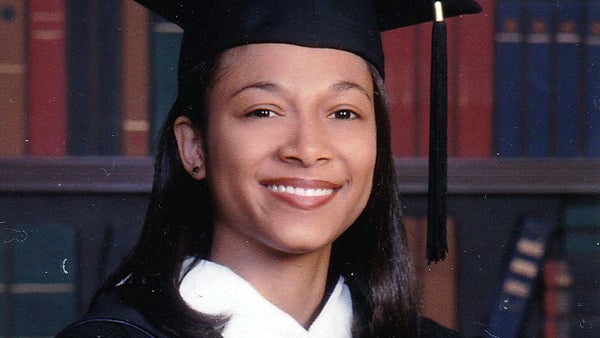How ‘West Philly’ must I be to be West Philly?

(Image courtesy of Celine Thompson)
I have grown to love living in Philly, despite the challenges of people, no matter their race or origin, constantly questioning my West Philly roots.
This is part of a series of essays about what it’s like to be you in Philadelphia. In an attempt to discuss issues of race and ethnicity respectfully and productively, we are inviting readers to share their stories with the NewsWorks audience.
I am a Philly girl, 32 years strong — and prayerfully with many more to come. I was born in Germantown, grew up in West Philly, and now live in Frankford, the home neighborhood of both of my parents, surrounded by aunts, uncles and cousins.
I have grown to love living in Philly, despite the challenges of people, no matter their race or origin, constantly questioning my West Philly roots.
It would hurt when other black people used my physical appearance and way of speaking to explain why I did not fit their West Philly image — but when my white driving instructor learned that I was a Penn grad and told me that he was more West Philly than I was (he was born and bred in Wynnefield), I was totally at a loss for the appropriate emotion.
Usually, when someone said I did not seem like I was from West Philly, it felt more like an attack on my “authentic blackness” than my right to claim the neighborhood, but to Mr. I-Bleed-West-Philly-More-Than-You, I could respond with nothing but incredulous laughter.
Over time, I accepted that I would continue to have experiences like this. When I was a student at Penn, it became apparent that they would not lessen in frequency or annoyance. As a freshman, I was excited to meet people from all over the country and the globe who would broaden my knowledge of places I’d never been or knew little-to-nothing about. Little did I know I would spend the next four years defending my city to people who were not open to exploring it.
Where are you really from?
But even before I could defend Philly, I had to convince them I was not an impostor.
I got a lot of “You’re not from Philly. You have to be from the suburbs.”
This was usually followed by contrasting me with a “real” (black) Philly girl:
“Your clothes/belt/shoes/purse do not match.
“Where is your weave/extensions?”
“You’re too nice.”
In hindsight, I should have expected this, but really — these brand-new Ivy Leaguers, most of whom were black like me, could barely remember my name. They had next to no experience observing people at 40th and Walnut. Yet they were adamant about my hometown and neighborhood of origin? Instead of calling out their ignorance, I defended the Philly girls they described (who I apparently did not resemble) and their right to look however they chose.
Years later, in graduate school, one such encounter was the straw that broke this weary camel’s back. While waiting on the EL platform one night after a frustrating day of unsuccessful writing, a man started a conversation with me:
Man: “Where are you from?”
Me: “West Philly.”
Man: “Where at in West Philly?”
Me: “West. Philly.”
Man: “You don’t look like you’re from West Philly.”
Me: “How am I supposed to look? Why can’t I be from West Philly?”
Man: “Nah, you look like you could be from Germantown or Mt. Airy, not West Philly. Hey, take it as a compliment.”
Me: “I don’t take it as a compliment.”
Although I was irritated, and my tone and facial expressions did nothing to hide it, this man still thought that I was too nice to be from West Philly! As if I’m not allowed to have a bad attitude, or to express it to another person, just because I don’t fit his understanding of West Philly. And the cherry on top: This poor soul’s social class assumptions in comparing Mt. Airy and West Philadelphia were insulting.
I belong
I am nowhere near finished defending myself, my city, or my neighborhoods. As a current Frankford resident, I still find myself teaching people about the neighborhood — even as I learn about it myself from natives.
About a year ago, a young woman told me that she would not have thought that I lived in Frankford, since her brief introduction to my personality did not fit what she thought she knew about the community. Given my West Philly experiences and my education, I could understand why she might think that. But as someone who knows Frankford as the ancestral home of a resilient, deeply rooted community of black folks, I’m offended.
My Philly experiences have taught me to be constantly open-minded, curious, and eager to challenge anyone’s limited understanding of this city and her people. As a still learning and maturing individual I am willing to admit that I may be overly sensitive to these challenges of my residential affiliation. I just happen to think everyone should see that there is enough room for someone like me in my own neighborhood.
—
Celine I. Thompson, Ph.D., is a lifelong Philadelphian, no matter what neighborhood she calls home.
WHYY is your source for fact-based, in-depth journalism and information. As a nonprofit organization, we rely on financial support from readers like you. Please give today.

